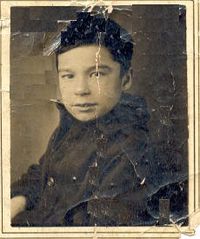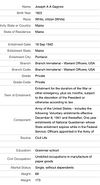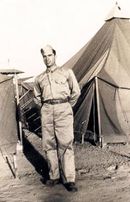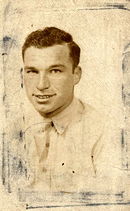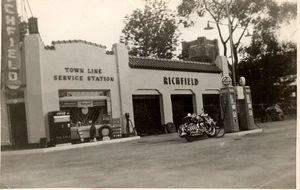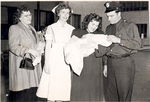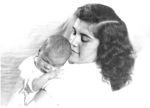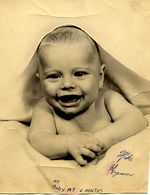Albert Adelard Gagnon
| Joseph Albert Adelard Gagnon | |
| Nationality: | |
| Born: | August 3, 1922 Jay, Maine |
| Died: | September 27, 1995 Titusville, Florida |
| Father: | Onesime Gagnon (1892) |
| Mother: | Rosa Yvonne Michaud |
| Spouse: | Marie Irene Lillian Perron |
| Married: | February 18, 1950 St. Anne's RC Church Hartford, CT |
| Children: | Louise Bernadette Gagnon Michael Albert Gagnon Timothy Alan Gagnon James O’Rene Gagnon |
| Religion: | Roman Catholic (RC) |
| Residence: | Livermore Falls, Maine West Hartford, CT Hartford, CT East Hartford, CT Livermore Falls, Maine Bradenton, FL Titusville, FL |
| Profession: | Mill Worker Gas Station owner Carpenter Chandler Evans worker Army Nat'l Guard Sargeant Federal Civil Service Livermore Falls Dump Mgr |
Contents
- 1 Introduction
- 2 Albert's Childhood
- 3 Albert’s Teen Years
- 4 Civilian Conservation Corps and the Military
- 5 You're in the Army Now - World War II
- 6 Back from the War
- 7 An Opportunity to Go Into Business With His Brother Bill
- 8 Some Call it Charm, Some Call it BullShit
- 9 Al Gets His Own Place
- 10 Albert and Irene
- 11 Engagement & Wedding, Before Ash Wednesday
- 12 A New Romance Blooms at the Wedding
- 13 Setting up House
- 14 A New Baby
- 15 In Moving to Hazel St, Albert Gets a Mother
- 16 Michael's Arrival
- 17 A Wonderful House to Grow Up In
- 18 The 2nd Floor Starts to Empty Out
- 19 More Grandchildren For Yvonne and Rene
- 20 Tim's Arrival Causes Much Excitement
Introduction
Albert grew up to be a wonderful storyteller and loved to regale his children, grandchildren, nieces, nephews, family and friends with stories of living on the farm, and his many adventures and exploits. He was known to deliberately exaggerate the facts (e.g. how many cows he had to milk every day, etc), and he did this always with a twinkle in his eye. When he was "caught" in an exaggeration by a listener who had also been there, he would say, "Don't wreck my story with the facts".
He often was the entertainer at family gatherings as he often brought his guitar, and would encourage anyone to sing along. He had the reputation in the family as the "fun uncle", and his visits to Maine were always occasions for happy gatherings. The following account is a paraphrasing by his daughter Louise Bernadette Gagnon of his stories, with the facts as carefully as possible corrected through cross-checking with his mother and siblings prior to their deaths, as well as any government and newsprint evidence as we were able to gather. Also included are personal remembrances of his children, other relatives and friends.
Albert's Childhood
Albert was born weighing over 12 pounds. We have no idea if this was the largest baby Rosa delivered, but we hope so, for her sake. He grew to be a happy go lucky child, impish, charming and very precocious. He also loved music. When they lived on the first farm on Moose Hill, there was a pretty Baptist church down the road nearby. On Sunday mornings you could clearly hear the bells pealing the beginning of services, and the whole Moose Hill valley would resound with the enthusiastic singing of the Protestant hymns. Albert remembered sneaking under the windows to listen to “Onward Christian Soldiers” or his favorite hymn, “The Old Rugged Cross”. The minister discovered him there one day, singing along while the choir practiced, and invited him to participate with his beautiful soprano voice. Of course, being Catholic, his family would not allow it.During the time when the family lived in town, Albert had many friends. He especially liked the Tagliante family, who spoke Italian at home, much like his family spoke French at home. While Albert was not much of a reader or scholar in school, he did have an ear for languages and accents. He picked up quite a bit of Italian when he was invited to have dinner at their house, and he loved their loud, happy communication.
Albert had a tough time at home. His father was a man of few words and not very demonstrative. Rosa was very strict and critical. Al's older brother Bill was serious and well-mannered. His mother was constantly asking him why couldn't he be more like his older brother? Al grew up truly convinced that his mother did not love him, especially as he rarely received any praise. This is a factor that affected him as the years went by.
By the time that Albert was in the 6th grade, in Mrs. Margaret Chase's class, he was known for challenging his teachers with questions and logic. One early Spring day, he reported having seen a certain bird, and the teacher told him that it was far too early in the season for that bird to be in the area. Albert, not liking to be called a liar, always had rocks in his pockets. He also had a slingshot that he’d made himself and had gotten quite good at hitting targets. He used his slingshot and killed one of those birds. The next day, he carried the dead bird’s body in his pocket on his way to school. When he arrived, he dumped the dead bird on the teacher’s desk to prove that he had not lied. He was made to stay after school, and missed the bus. This would mean that he would arrive home late, miss his evening chores, and get scolded (again!) by his parents.
He was brave at times, but not as brave as he would like. When he had to walk home, he had to pass a little country cemetery. When he was kept after school, he ended up passing the cemetery just as it was getting dark – enough to scare many kids of his age. He often spoke of running as fast as he could when he went by the place.
Mrs. Chase also used to keep a handkerchief in the cleavage of her dress. One day during class, she went to retrieve the handkerchief and her breast popped out, too. Albert exclaimed, “Look at the milk wagon!” causing the class to erupt into peals of laughter and embarrass the teacher. Again, she kept him after school and caused him to miss the bus. Once again, he had to walk all the way home. "don't wreck my story with the facts".
Albert and the other children sometimes worked for a woman in the area, named Mrs. Royce, but all the kids in the area called her "Grammy". Grammy Royce was very strict, and to hear Albert tell the story, very thrifty. She would promise to pay them for work, IF, they did a good job. No matter how hard the kids worked, she would always come and find something wrong with their work, so that she wouldn’t have to pay the whole amount. He remembers weeding her large garden (over half an acre) often, with Grammy Royce closely inspecting his work, before begrudgingly giving him a penny. Half an acre for a penny!
Not surprisingly, Albert was also a daredevil. In the winter, he and his siblings skated on the ice. Albert had a pair of hockey skates. He practiced repeatedly jumping over obstacles on the ice. He delighted in his biggest accomplishment – jumping over three barrels placed side by side.
One time, when Christmas was approaching, was helping his father chop wood. The axe slipped, and the blade, which was very sharp, sliced through his boot and cut his foot. He never cried – it was not expected. He rushed back to the house, put a piece of salt pork on the wound and wrapped it in a bandage, and changed his bloody socks. After taping up his boot so that the snow wouldn’t get in, he went back to finish chopping the wood.
Albert’s Teen Years
In 1937, when he turned fifteen, Albert got his first guitar by selling cans of Cloverine salve in the town. It was a lot of work, but he finally earned enough points. He taught himself to tune the guitar, and to play it. This started for him a lifelong love of playing music, a gift he would share with his own family in years to come. Albert and his LaPlante cousins, who lived on Shuy Flat, Emile, Robert, and Ileude, got together often and played music. Albert and Ileude on guitar, Robert on the violin, and Emile played several instruments: piano and organ, drums and mandolin.
Albert had always been a big strong fellow. When he was a teenager, he was often mistaken for an adult. One day when he was about fifteen, he heard about a traveling troupe that was coming to town, to put on a boxing exhibition. Albert who was often impulsive, responded when the troupe asked for volunteer opponents. The troupe manager should not have allowed him to fight, because he was underage. But he never thought a thing about it because it didn’t occur to him that Albert was too young.
Without getting his parents permission, Albert was matched against an opponent and actually got into the ring. He was holding his own when one of the townspeople recognized him. They went to the mill to inform Onesime, who immediately left work to get the fight stopped and prevent Albert from being injured. He was too late, however, because Albert had already won his match! Albert collected his money, but also a strong scolding from his father, and a good deal of respect. Onesime complained to the troupe manager and threatened to report him to the authorities. However Albert was allowed to keep his money.
Civilian Conservation Corps and the Military
In October of 1939 when Albert was 17, jobs were very hard to come by, as the depression was still on. Now that the family was not living on the farm and growing much of their own food, it was difficult to feed the family. Bill had already been in the CCC’s, and it was now Albert’s turn. In October of 1939, Albert, who had only completed school through the 8th grade, went into the CCC’s to help support the family. It was not uncommon for the oldest boys to join the CCC’s, earn their own room and board, and send money home. Albert was actually in the CCC’s twice. His acting company commander was Archie Littlejohn. He returned to the CCC’s for a second time as a laborer in the 1130th Company on October 29, 1940 and was honorably discharged on March 19, 1941, when he got a job. This time, the company commander who signed the discharge papers was Stephen Gaffney.
By this time, with all the rumbling about war in Europe, Al followed the example of his older brother Wilfred by going to Lewiston with several of his friends to enlist in the Marines. However, his eyesight was not quite sharp enough, so he was refused. Only one or two of his friends were accepted. Undaunted, they went over to the Army recruiter, whose requirements were a little more lenient.
You're in the Army Now - World War II
Albert sold his car and enlisted in the army on September 19, 1942, as Serial# 11097328. We still have his dog tags, which list him as Joseph A A Gagnon. In addition to serial number, dog tags also listed the father’s name and address. This was presumably to know where to send the body, in case of death or serious injury. In the war, he was posted to 3747th QM Truck Company, Base A, APO 928, in the South Pacific as a member of the truck company.One time, during the war, Albert and another guy in his crew were sent to unload a truck off of an LST (vehicle carrier) during active enemy fire. There were bullets flying past his head, in between he and his buddy while they were moving this truck for use. Albert was so nervous that he grabbed the other guy’s leg with such a strong grip that he left fingerprints and bruises on the guy’s leg that lasted for weeks.
Albert was stationed for a time in Papua, New Guinea. He remembers some of the natives there went topless. He made friends with everyone. (Of course, he also managed to get pictures that he was able to send home. These were seen by his children many, many years later.) He also got advice from an older native woman, “Two women, one roof, no good!” which he quoted many times after he married and had a daughter. He also spent some time in Manila, in the Philippines, where he was sent for R&R (Rest & Relaxation).
Another time, his unit had made camp near the enemy. That night, Albert was in a two man tent, and had to go to the latrine. He got pinned into a corner of the latrine by a huge poisonous snake. Because of the proximity of the enemy, he could not call out for help. He froze in place, and eventually the snake made its way out of the latrine. When Albert finally got back to his tent, he found that the enemy had slashed his buddy’s throat, and he was dead. Clearly, the snake had actually saved his life.These incidents and others caused him to be very jumpy when he returned from the war. Loud, unexpected noises would startle him, and he would react defensively, by instinctively throwing a punch or kicking with his foot. His buddies liked to tease him, and make him jump. Sometimes, someone would get seriously hurt in the midst of Albert’s lightning-fast reactions. One time his buddies at the mill dropped something behind him, and he automatically lashed out with his fist. Unfortunately, an attractive young woman was innocently walking by, and Albert accidentally broke her jaw. The instigators were fined by their boss, and nearly fired.
There are several pictures taken of him during the war, including some taken on R&R in Australia. He enjoyed Australia very much – loved the country, the accent and the happy-go-lucky attitude of the people. He met and began courting a young woman by the name of Margaret, and must have mentioned her in his letters home. Later, when he met Irene, his family informed her that he had had a girlfriend in Australia. Margaret’s father was not too happy about her going out with an American soldier. He warned her about the fact that they only had one thing on their minds. Not that Albert would have been like that! Margaret’s father had good reason to worry – he himself had been an American soldier during World War I, and had settled in Australia.
Late in the war, Albert contracted malaria. He got so sick that he had to spend time in a MASH hospital. In the course of recovering from the disease, he had lost a lot of weight, and ended up less than 140 lbs. The records of the hospital were later destroyed, when the hospital itself was under attack and severely damaged. As a result, Albert’s service records never reflected that he had contracted malaria during the war. It was an ongoing struggle to get VA benefits after the war, for recurrences of the disease.
According to the paperwork we have, Albert was promoted to Private First Class on January 1, 1945. Actually, this was the second time that he was promoted to PFC. Previously, he had been on guard duty, overseeing several prisoners of war. He was on duty when one of the prisoners tried to escape, and Albert was forced to shoot and wound him. Although he followed procedure, he was immediately demoted and transferred to another base, to avoid enemy retaliation. He had to re-earn his PFC promotion once again.
Back from the War
When Albert returned from the war, he bought a 1930 Model A Ford. He paid $15 for it. When Albert returned to Livermore Falls from the war, he re-applied at the mill for his job. Initially, they refused, but Albert did not take no for an answer. The fact was, that the mill had promised all of the workers who went away to the war that their jobs would be held for them. Albert threatened to go to the Veteran’s Administration in Lewiston and report the problem. His finely tuned negotiating "skills" resulted in him getting his job back immediately.
With his discharge money and the money he was making in the mill, Albert went to Lewiston with his cousin Robert LaPlante and purchased a car. Uncle Jim, his mother’s younger brother, was visiting shortly after and asked to borrow Albert’s new car for a day. Albert, out of respect for his uncle and always a generous person, of course allowed his uncle to borrow his new car. His brothers and sisters reproached him for his foolishness.
Unfortunately, Uncle Jim was not very responsible. He managed to disappear with the car, load it up with all kinds of junk, horse equipment, bridles, saddles, etc. and went on an extended drinking binge, doing nothing to care for the car except perhaps to put gas in it. He ruined the engine by running it dry of oil and when he finally returned the car, it no longer ran. Albert lost everything he’d put into the car, and was never reimbursed. Not surprisingly, he also heard the expected choruses of “I told you so’s” from his siblings who had advised against it.
An Opportunity to Go Into Business With His Brother Bill
Around 1947, his brother Bill, who was living in Connecticut, contacted him about a business proposition. It seemed that Bill had found a gas station for sale in an excellent area on the Hartford and West Hartford town line that he wanted to purchase. Since he needed a mechanic, and a partner he could trust, he asked Albert be a partner. Albert, who was never fond of working in the mill, and was an adventurer at heart anyway, jumped at the chance.Together, they purchased what was at the time an Atlantic-Richfield station ( now called ARCO), on the corner of Prospect Ave. and Farmington Ave. At first, he moved in with Wilfred and Rena. Jeannie, who was Albert’s godchild, was just a baby. Wilfred and Rena had a small house in Newington, and Albert rented a room from them in their unfinished, unheated attic. Because of Uncle Jim, Albert did not own a car. And since he and Bill worked different shifts, Albert took a bus to and from work.
Some Call it Charm, Some Call it BullShit
These were memorable times for Bill and Albert. They were their own bosses. Albert enjoyed working at the station. He was the salesman and mechanic, and Wilfred ran the books, and did the ordering of supplies and equipment. Wilfred was quiet and serious, but Albert turned on the charm, and attracted many new customers.
One technique he used was to paint a sign, and set it up at the sidewalk, where it was visible from all sides when approaching the intersection. He would often deliberately misspell words on the signs, causing customers to come in, buy a gallon or more of gas, so they could tell him privately that he had made a mistake on the sign. Of course, once they came in, he turned on his natural exuberance. He struck up a conversation, checked their car’s oil levels and other fluids, and asked where they had work done. They would invariably return and become regular customers. He would then change the sign and make a different mistake, and the cycle would start all over again.
Albert also made a lot of lifelong friends while working there. He met Charlie Amarillo and Jesse Campbell when they drove in on their motorcycles. Albert gave them mechanical assistance, and they would often let him borrow one of their motorcycles if he had a date. He bought himself a leather jacket, and a wide leather belt, studded with large fake jewels. Albert planned on purchasing a motorcycle of his own when he saved up enough money. Although he never did ever get a motorcycle, he kept the jacket and belt for many years.One of his regular customers was Mrs. Auerbach, who owned G. Fox & Company, a local high-end department store. Albert was always a strikingly handsome man, and very muscular. Mrs. Auerbach offered Albert a job as a male model. He graciously, but promptly refused, because it not a manly enough profession, and he believed it would present the wrong impression.
Al Gets His Own Place
After a while, Albert began to have problems living at Wilfred’s. Over several months, it became apparent that there were growing tensions at Bill and Rena’s. For one thing, Rena did not like the business – she thought it was dirty and smelly. She hated the laundry generated at the gas station. Bill was also a father with a young daughter, and Albert was single. It soon became apparent that the shifts were unequally divided. Albert would draw many more evening and weekend shifts. Albert, who was not seriously dating anyone at the time, usually accommodated the extra shifts to help Bill keep the peace and spend time with his young family.
Albert decided to move out of Bill’s, and find his own accommodations. Albert moved into a rooming house on Prospect Ave. where his friends Charlie and Jesse lived. In fact, they all had adjoining rooms. This worked out great, because it was only a few blocks away from their gas station, and now he could walk to work. It helped him save money and time, instead of being stuck on the bus. He started taking his meals at the luncheonette across the street from the gas station. This turned out even better, because one day, he met a beautiful girl with dark auburn hair. She worked behind the counter on Sundays as a fill-in cashier, and her name was Irene. Can’t you just see the sparks flying?
Albert and Irene
This was a whirlwind courtship. They met in the Fall of 1949. He would show up under her window at work on a borrowed motorcycle, with his guitar and serenade her. Her friends would say. "Your boyfriend's here!", but with the noise from the revving engine, she already knew. She feigned embarrassment, but she was secretly pleased.
They would go on picnics to their favorite place on the grounds of the reservoir in West Hartford, or Elizabeth Park. He found out she couldn't cook, and he didn't care. Although they were from similar backgrounds (French Canadian-speaking families, each having several brothers and sisters, parents having experienced hardships and the loss of at least one infant), Albert and Irene couldn't have been more opposite. He was large, muscular, adventurous, not well educated, raised on a farm, been through a war, seen a lot of the world, friendly and gregarious, and a bit of a ladies' man. She was educated and well-read, quiet and shy, careful and risk-averse, had dated some, but not much. None of that mattered - Albert was smitten, and Irene had found her knight in shining armor, someone handsome, romantic, very protective and exciting.Albert brought her home to Maine to meet his parents, and show her where he grew up. He enjoyed sharing many of the stories of his childhood, his friends, and his adventures on Moose Hill. It was such an exciting life in comparison to her own quiet, serious life, that she was fascinated. Irene was very nervous and intimidated meeting Al's family, and much to her chagrin, she made a mixed impression. On the plus side, they thought she was pretty, and she scored points because she spoke fluent French. On the negative side (especially in Rosa's mind), was the fact that Irene could not cook, a fact which Rosa found incomprehensible and scandalous for a housewife. Irene, who was shy and not aggrest sive in the least, was very grateful to return to Connecticut at the end of that weekend. She was intimidated by this loud, competitive group of people.
It was also around this time that he and Bill decided to sell the business. The gas station was well-run and lucrative, but his relationship with Irene now meant that he was not so flexible about all those extra shifts. Also, Rena had really reached the end of her tolerance for the dirty, smelly laundry impact. They sold the business at a profit, and Bill entered the job market with his tool and die maker skills that he'd acquired years before in Maine. It was this education he used as a foundation upon which he would now build a successful career.
Albert, not possessing a high school education, found a job as a carpenter, and had moved to accomodations on Allyn St.
Engagement & Wedding, Before Ash Wednesday
Albert bought the engagement ring on "time", i.e. paying a little at a time, as and when he had extra cash available. Thankfully, he was able to negotiate with the jeweler to get the ring itself before he had finished paying for it, so he could present it to Irene when he proposed. (He didn't actually finish paying for the ring until 2 months after the wedding.) He proposed to Irene right after Christmas, 1949, and they initially planned a late Spring wedding. But that did not last, as Albert was impatient.
- Click on the photos below to view a larger image:
Now, since they were both Catholic, they were not going to be allowed to marry until after Easter, which was April 9, 1950. Albert did not want to wait that long, he wanted to get married much sooner. The Catholic church does not allow weddings to occur during Lent, which begins on Ash Wednesday. In 1950, Ash Wednesday was February 22. So they approached Father Routhier at St. Anne's church, and requested a date prior to Ash Wednesday. It took a lot of convincing, but they were able to make arrangements to marry on the last possible Saturday before Ash Wednesday, February 18th. Now, they had to rush to finish making the rest of the wedding plans.
Since they had already announced their engagement around Christmastime, and their plans to get married in the late Spring, when the new date was announced the gossiping tongues in the family started wagging. Speculations were rampant that they were rushing the wedding because Irene must be pregnant. Irene was mortified, as she had carefully preserved herself for marriage, and that was the reason Albert wanted to marry sooner!!
- Click on the photos below to view a larger image:
A New Romance Blooms at the Wedding
Albert's younger brother, Norman, was an usher at Al's wedding. Norman was a month shy of his 18th birthday at Al's wedding. He was paired with Irene's younger sister, Yolande, who was a bridesmaid. Yolande was only 16 1/2. They were immediately attracted to each other, and began a long distance courtship at the wedding, which culminated in their marriage a few years later.
Setting up House
Al and Irene found a small 3 room apartment on Broad St, just down the block from Irene's parents. As the oldest daughter, she was also the first child in the family to get married. Irene continued to work at the Aetna, and Al at his job as a carpenter. Just like at the gas station, Albert was happy to have Irene would "run the books" for the family. Albert was all too happy to hand over his check and never have to keep track of paying the bills.
There were struggles as she learned to cook, and Albert, who did know how to cook a little, tried to help. He was basically a meat and potatoes guy, and having lived on a farm and seeing what chicken ate, he refused to ever eat chicken himself in any form. In fact, he also never ate fish either. "If it flies or swims, don't feed it to me", he told her. So they ate a LOT of ground beef and hot dogs. Irene could cook herself those things, as long as Albert didn't have to eat them. There were many failed and burned dinners as she learned to cook. But Albert didn't care, he ate it anyway, and claimed that burned food made your singing voice better.
One thing that Irene did well in the kitchen was bake. There were cakes, cookies and pies. It was a good thing that Albert was an active guy, because he would have gained a lot of weight that first year of marriage otherwise.
Within several months, Irene became pregnant, and Al was overjoyed. By the time the baby was due, Al had gotten a better job with regular hours as a security guard at Pinkerton's, because they had decided that Irene was going to give up working to stay home with the baby.
A New Baby
Irene never felt so healthy as when she was pregnant. And Albert, the big strong guy, experienced sympathetic morning sickness every morning of the nine months. In addition, he experienced sympathetic labor pains too, and told Irene when it was time to go to the hospital.
The birth itself was very difficult - 27 hours of excruciating labor, and the baby presented as breach. The doctor reached in and turned the baby around, but this baby was determined to arrive feet first into the world, and reversed once more. The doctor reached in and yanked the baby out, nearly killing Irene, who began to bleed profusely. After a while, the medical staff was able to stop the bleeding, but by this time, she was very weak. The doctor presented Irene with a baby girl, and Albert was finally allowed into the delivery room, finally. He nearly killed the doctor, and called him every name under the sun, the cleanest of which was "an incompetent veterinarian". Needless to say, this doctor would never deliver another baby for them again.
- Click on the photos below to view a larger image:
When he arrived in the delivery room, Irene was crying. She was afraid that being such a macho guy, he would be disappointed that their first child was not a boy. He tried to soothe her and convince her that not only was he not disappointed, but he really wanted a girl and actually was very pleased. He empathized with her ordeal, and told her that she could name the baby herself. Irene chose Louise Bernadette. (She had always loved the story of the little French girl, Bernadette Soubirou, who had seen the Virgin Mary at Lourdes, and she had always loved the name Louise. Unbeknownst to Irene, the name Louise means "Famous Warrior", which turned out to be an apt name for the baby that was born that day!
In Moving to Hazel St, Albert Gets a Mother
Around the time that Louise was born, Irene's parents were negotiating to buy a 2-family house nearby on Hazel St. They would need a tenant, and offered the first floor apartment to Albert and Irene for a good price. Albert was concerned about living that close to his in-laws. After a brief discussion where Irene ultimately prevailed, Albert and Irene moved to the first floor apartment on Hazel St. Rene and Yvonne moved to the 2nd floor apartment with Yolande, Donald, Raymond, Yvette, Leo, Bobby and Roland - all of whom were not yet married in 1951. The 2nd floor apartment was much bigger because it also had access to the 3rd floor, where there were several additional rooms, so it accommodated everyone.
Despite his initial reservations, it was living this closely to his in-laws that Albert made an important discovery that would change his life. He found out that Rene was not only a rude and frequent drinker, but that he abused his wife. Yvonne was tiny - only 4'11" tall. Albert hated two things: bullies, and people who allowed bullies to victimize people who could not defend themselves. Now this situation was totally unacceptable to Albert, and he lost all respect for Irene's brothers. Albert went upstairs, and confronted Rene by grabbing him by the overalls. He threatened Rene with bodily harm if he ever touched Yvonne in anger again. Rene had no doubt that he meant it, and since Albert was much larger and stronger than he, there was no further trouble upstairs.
Yvonne cried in gratitude, as her sons had never stood up for her. She had loved this big strong man before, who had given her her first grandchild, but now she doted on him. She made him homemade donuts, crepes, root beer, bread, baked beans, anything he wanted. Her pot roast was the best he had ever tasted in his life. Finally, Albert had a mother figure in his life, and he felt loved and appreciated. He would do anything for Yvonne, and was very protective of all of the women in his life: his wife, his daughter and his mother in law. And Yvonne was the best cook he had ever encountered - even better than his own mother. So, it really didn't matter if Irene didn't know how to cook - he wasn't missing too many meals.
Behind the garage on Hazel St was a large pear tree, and space for a large garden. Although Rene was raised on a farm, he had no interest in farming. Yvonne wanted a garden of vegetables so she could can them. Albert happily tilled and put in a large garden of tomatoes, peas, beans, cucumbers, carrots, potatoes, beets, radishes, peppers, onions, scallions, squash and zucchini, anything she wanted. She, Yvette and Irene spent the late summer canning the harvest, and Albert shamed Rene into building Yvonne shelves in the basement for storing all the jars. They also canned many, many jars of pears. Every year, the garden got bigger and the yield got better.
Michael's Arrival
Within a few months, Irene was pregnant again. Again, she felt more healthy than ever and Albert had morning sickness every day. When Louise was 18 months old, Michael Albert was born, with beautiful blonde hair and blue eyes. True to his word, Albert had insisted on a different obstetrician.
The two children could not have been more opposite: Louise was aggressive, confident and quick-witted and Michael was gentle, quiet, shy and much more thoughtful. They each mirrored the personality of their opposite sex parent. If the family had stayed this size, it could easily have become permanently polarized and dysfunctional. Thankfully, that was not the case, as it was soon to be expanded again.
By this time, Albert had changed jobs, and was now working at Chandler Evans, a manufacturing company in West Hartford. This was a better job, making the family more money.
A Wonderful House to Grow Up In
An interesting fact was that French was the primary language spoken in the house. The children freely went upstairs to visit their grandparents all of the time. It was very easy to spoil them, and make no mistake - they were spoiled!Canadian relatives visited periodically. Sunday dinners were upstairs, usually roast chicken (with hamburgers for Albert, of course). Yvonne was also a musician - she played the fiddle, Donald played the drums, Roland on the trumpet. The family often got together to play and sing. There was also a small concertina, but we have no information as to who played it. Everyone sang, including Louise and Michael.
The 2nd Floor Starts to Empty Out
In May, 1953, Yolande and Norman got married and settled into a small apartment nearby. Around this same time, Roland also left home to marry Sally. A few months later, Leo left home to marry Leonie. The only siblings Irene had living upstairs now were Yvette, Raymond, Donald, and Bobby. No one on the 2nd floor had ever learned to drive, nor owned a car, so they either traveled by bus or walked wherever they needed to go.
Donald had never gone beyond 3rd grade and could not read, but he was able to get a job in a bakery at minimum wage, only because he was able to demonstrate an ability to memorize recipes. Raymond worked at the G. Fox department store in downtown Hartford as an elevator operator (it was a job with its ups and downs!). Yvette was a Licensed Practical Nurse working at Hartford Hospital, and Bobby was in college, the first in the Perron family to go that far in school.
More Grandchildren For Yvonne and Rene
The household settled into a routine. On Sundays, Roland, Sally, Norman, Yolande, Leo and Leonie would visit upstairs and have dinner. Al and Irene would often join the group with the children. In 1954, Leo and Leonie had their first baby, Lynn. Later in 1954, Norman and Yolande had their first baby, Patty. 1956 was a bumper year for grandchildren. Norman and Yolande had Catherine in January, Leo and Leonie had Cheryl in the Spring, and Al and Irene had Tim in September.
Tim's Arrival Causes Much Excitement
In September of 1956, Louise was going to start kindergarten. All summer long the preparations had been in progress for the first day of school. Irene promised to walk her daughter to school. The dress had been picked out and hung up for so long, it got dusty and had to be washed at least once. On the morning of school, Louise got up and could barely contain her excitement, and went running into her parents' bedroom, but they were not there. Aunt Yvette was there to explain that Mommy and Daddy were at the hospital and the baby was coming today. Louise was crushed! Aunt Yvette helped her to get breakfast and get dressed, and walked her to school. Big streets had to be crossed, and Louise was instructed to make sure to wait for someone to pick her up after school, and not try to come home by herself.
In the meantime, Irene was in distress. She knew she had disappointed Louise, but moreover, she was desperately worried about the baby. Timothy was born with yellow jaundice, who required blood transfusions to be healthy. He was the smallest of her babies, at 5lbs 5oz, and looked very vulnerable.
The morning kindergarten session was completed around noon, and Louise proudly was clutching her first day papers. She reached the intersection where she was supposed to wait, but no one was there. There was an older child crossing guard, but she refused his help, following her instructions. She waited, with increasing impatience, but no one arrived to pick her up and walk her home. They were all at home, worried about the new baby and if he would survive.
The crossing guard finally told Louise that he had to leave. So Louise, in disgust, disobeyed the instructions, got home safely and walked in the door. When she arrived, her aunt and uncles said, "Oh my God! We forgot Louise!", who replied, "You're damn right you did!". She went into her room and slammed the door, and refused to speak to anyone. Irene called on the phone and Louise refused to speak to her, too. When Louise found out about the baby, and that it was another boy, it just made matters worse. She had been hoping for a sister. The day that was supposed to be so special was turning out to be terrible.
Michael, who was 3 and had been home all day, was pretty happy. He was going to have a brother to play with. It was a few weeks before Timmy was able to come home. By that time, Louise had pretty much gotten over it, and actually liked Timmy. But she never lost the opportunity to tease him about it over the years.

